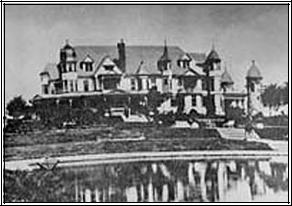March 28 Sunday – At 23 Tedworth Square in London, Sam wrote to Pamela Moffett. Evidently Pam had written and sent a book, Belief of Unitarians for Sam and Livy to read. He wrote that he’d directed Harpers to send her a copy of JA, something he “supposed” he’d “attended to long ago,” which infers she might have asked for it. She also must have complained about Sally Moffett leaving too much money to her daughter (unnamed) for Sam replied:
The world is all alike! Sally Moffett’s daughter did not need all that money, but Sally could spare none of it for you. When Livy was well off she made a will in which she left money to every person of her own kinship & mine, & in generous measure, too. The Sally Moffetts are very plenty, & shabby, & the world is richer without them than with them [MTP].
Note: Sally Moffett (born Sally Coxe) was the wife of Erasmus Mason Moffett, brother of Pamela’s husband, William A. Moffett. Samuel Webster writes that Erasmus “ended up a millionaire and caused a family feud when he died. The feud evidently was over money left to Sally’s daughter The widowed Sally Moffett had two daughters; Sam wrote of seeing and admiring them in Chicago, in his July 15, 1886 letter to Sister Pamela: “they are lovely, & the purity & probity in those girls’ faces is as clear-cut as the mint-stamp on gold coin; & their character in all ways is easily recognizable as twenty-two carats fine…” [MTBus 19, 26, 291, 363]. Also see a Jan. 12, 1885 picture of Sam, George Washington Cable, the widow Sally Moffett and her daughters, Lizzie and Ella Moffett, in Mark Twain Himself: A pictorial biography, p. 188.
Sam may have felt it a good day to catch up with his siblings, as he also wrote to Orion Clemens. This letter is also a response to one not extant.
I was greatly touched by Mr. Hubinger’s generous offer. I beg that you will give him my most cordial thanks.
Other unknown friends have made like offers to me—some from Great Britain—some from America—& have made me proud. But I cherish the feeling that all in good time I shall work out of debt by my own exertions. I have had this feeling from the first, & have never seen any reason to change it.
We are all in pretty fair condition, as to health, & none of us in fear that the debts will not be paid [MTP].
Note: Offers and suggestions were coming in to raise money in Sam’s behalf to help him pay off his debts, after rumors circulated that he was destitute and in poverty in London. These would culminate in the June 1 campaign by the NY Herald. See entry. Details of John Carl Hubinger’s (1851-1908) offer are not known. From the Keokuk history web site:
“J.C. Hubinger opened his starch factory to Keokuk in 1887, producing Elastic Starch. He was also an important figure in The Electric Light and Power Company, Mississippi Valley Telephone Company, Keokuk Brick Company, and the YMCA. He also played a big role in bringing electricity town. In the late 1880’s Hubinger built a mansion in the area of what is now 1229 Grand Avenue. The property included both sides of Grand Avenue from 8th to 15th Streets. Included in the landscaping of his home was a pond fed by an artesian well that included an island in the center. The pond was stocked with fish, and there were boats which the public was invited to use. After losing out to larger telephone companies and failing in health, J.C. Hubinger died in a boarding house at 616 High Street in 1908.”
 Above: The Hubinger mansion. The lake in the foreground was fed by artesian wells. Sam may have been well aware of this mansion and undoubtedly would have admired its style.
Above: The Hubinger mansion. The lake in the foreground was fed by artesian wells. Sam may have been well aware of this mansion and undoubtedly would have admired its style.
Sam’s notebook:
Mar. 28. Twichell sends me a vast newspaper heading the breadth of 5 columns, “Close of a Great Career,” in which it is said I am living in penury in London & that my family have forsaken me. This would enrage disgust me if it came from a dog, or a cow, or an elephant or any other of the higher animals but it comes from a man, & must allowance must be made for Man [NB 41 TS 21].